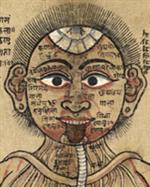
Origin of Word in Ophthalmology
- Aptamers (from the Latin aptus - fit, and Greek meros - part) are oligonucleic acid or peptide molecules that bind to a specific target molecule.
- Fornix: arch
- pellucid, meaning clear
- Ligneous: woody
- Limbus: border in latin
- The term lagophthalmos comes from the Greek word for hare (lagos) because rabbits were thought to sleep with their eyes open.
- pagetoid spread: distinctive histological pattern of epidermal infiltration of Paget's cells has led to the use of the term “pagetoid spread” to indicate any condition where cells are distributed singly and in small groups throughout an epithelial layer. For eye pathology, you need to remember sebaceous gland carcinoma.
- The word "trachoma", derived from ancient Greek, means “rough eye”, presumably due to the “cobblestone” appearance
- Canthus= Greek word “kanthas” = angle
- Levator palpebrae superioris = In Latin, “levator” = to lift, “palpebrae” = an eyelid, superioris = upper
- Caruncle = Latin word means flesh.
- Plica semilunaris = Latin word “Plicare” = to fold, “semilunaris” = half moon.
- Tarsus = Greek word means flat, Ancient greeks used to call various flat object as tarsus- suchas wing of bird, blades of sword.
- Chalazion= A Greek word which means “hailstones”.
- Papilla= A Latin word means elevation
- Punctum= A Latin word means point
- Lacrima = Latin word for tear
- Conjunctiva = “conjoin” = to join = as this structure (mucous membrane) joins eyeball to the lids.
- Pterygium = In Greek means wing (of a butterfly)
- Pinguicula = Greek “ pinguis” = fat
- Cornea = “Kerato” or Latin " cornu" means horn like. Ancient greeks used to believe that cornea is derived from thinly sliced horn of animal.
- Choroid= from greek word “chorion”
- Aqueous = Latin word for water
- Acanthamoeba= Greek akantha - thorn, spine; amoibe – change
- Humour = Latin “humour” = moist.
- Gonio= from greek means corner
- Scopy = means examination
- Sclera = Greek “scleros” = hard (“epi” = upon)
- Lamina cribrosa = Latin ‘cribrum’ = sieve
- Uvea = Latin word “uva” = a grape, Why a grape? Well, the idea was that, if the stem is removed from a grape, the hole looks like the pupil and the grape the eyeball.
- Iris = Greek word “iris” = rainbow,(a greek goddess)
- Pupil = Greek “pupa” = a small doll like figure.
- Zonule = both greek & latin word means belt or ring
- Coloboma = greek word means curtailed or mutilated
- Vitreous = Latin “vitreous” means glass
- Retina = latin = net
- Macula lutea = Latin “macula” = a spot, “lutea” = yellow.
- Fovea centralis = latin for central small pits/depression
- Optic Chaisma= from greek word chi or ? ,which means crossing ( greek ? was given Galen, famous greek physician)
- Geniculate body = Latin “genu” = knee (because of its knee shaped structure)
- Focus = Latin word means fireplace, as fireplace was the central point of any room in ancient times.
- Emmetropia = Greek “em” = within, “metro’ = measure & “opia” = eye.
- Acuity= Latin acuo - to sharpen (similar word of origin acupuncture,acute,just note the use of Acuo)
- Hypermetroopia = Greek “hyper” =beyond, “metro” = measure, “opia” = eye.
- Myopia = Greek “my” = close & “opia” = eye
- Aniseikonia= Greek “an” = not, “iso” = equal & “eikon” =images
- Aphakia = Greek “a” = Absent, “phaco” = Lens
- Presbyopia = Greek “presbyo” = old, “opia” = eye
- Spectacle = Latin “spectaculum” = show
- Keratoconjunctivitis Sicca = Latin sica = dryness.
- Herpes= Greek “herpes” = creep, (metaherpetic keratitis , “meta” = after)
- Corneal dystrophy = Greek “dys” = defective, “trophy” = nourishment
- Corneal guttata =Latin “gutta” = drop
- Glaucoma = Greek “glaukos” = bluish gray
- Buphthalmos = greek “buph” = ox
- Applanation = Latin “ ad planare” = to flatten
- Tonography = Greek “tonos” = which can be stretched, “graphos’ = write.
- Strbismus = Greek “strabismos” = twisted
- Epicanthus = “Epi” =upon, canthus = angle.
- Orthoptics= “orthos” = straight & “ops” = eye.
- Amblyopia = Greek “amblyo” = dull/lazy, “ops” = eye.
- Rhegmatogenous = Greek “rhegma” = hole,
- Retinoschisis = Greek “schisis” = to split
- Arteriosclerosis = Greek “scleros” = hard, Latin “osis” = full of.
- Exudates = Latin “exe” = out, “sudare” = to sweat
- Neovascularisation =Greek “neo” = new.
- Circinate retinopathy= Latin, circum =circle
- Vitelliform degeneration = Latin “vitellus” = egg yolk
- Angioid streaks = greek “angi” = vessels
- Tapetoretinal Degeneration = Greek “tapetum” = carpet
- Xanthelasma = Greeks “xanthus” = yellow “elamos” = a metal plate.
- Hemangiomas = Greek “haima” = blood “angioma”= tumor of vessels
- Leukocoria = Greek “leuko” = white “kore” = pupil.
- Microaneyrysm = Greek “aneurysma” = a swelling.
- Amaurosis= Greek "amauros" means dark and "osis"- condition
- Atropine= Greek "Atropos" = undeviating; one of the three Fates, fabled to cut the thread of life”(because of the lethal nature of the plant Atropa belladonna)
- Bombe = French "Bombi" means rounded, bulging
- Exophthalmos = Greek, ex = out of, ophthalmos = eye
- Optic nerve = Greek “optikos” = an eye.
- Occipital area = Latin “oc” =back of, “caput”=head.
- Trigeminal nerve = Latin “trigeminus” = triplets.
- Trochlear nerve = Latin word means pulley.
- Ophthalmoplegia = Greek “plegia” means paralysis.
- “ec” = out
- “tomy” = to cut
- “Ectomy” = to cut out
- Cataract = Greek "katarrhakies" - a downrushing means something that rushes out like a waterfalls
- Haptics = Greek “haptics” = to lay hold of
- Dellen= plural of Dutch delle - low ground, pit
- Dendrite= Greek dendron – tree
- Diopter= Greek dioptra - leveling instrument
- Drusen= plural of German druse – bump
- Hippus= Greek hippos - horse (spasmodic movements of the iris fancifully suggesting the galloping of a horse)
- Sarcoid= Greek sarx - flesh; - eidos - resemblance
- Pannus= Latin pannus - cloth
- Schisis= Greek schizo - to cleave or split, to separate (hence schizophrenia)
- Scintillans= Latin scintilla – spark
- Xerosis= Greek xeros – dry
- Luxated = Latin word means dislocated.
- Keratome = greek “tome” = to incise.
- Blepharoplasty = Greek “blepharo” = eyelids.
- Dacryo = Greek “Dakryon” = tear.
- Entropion = “en” = in, “tropia” = to turn.
- Ectropion = “ec” = out, “tropia” = to turn
- Vernal = in the spring
- Toxo: arc or bow, as tachyzoites are in shape of acr.
- keralomileusis comes from the Greek words for "cornea" (kerato) and "to carve" (mileusis).
- compiled & published by Dr Dhaval Patel MD AIIMS
